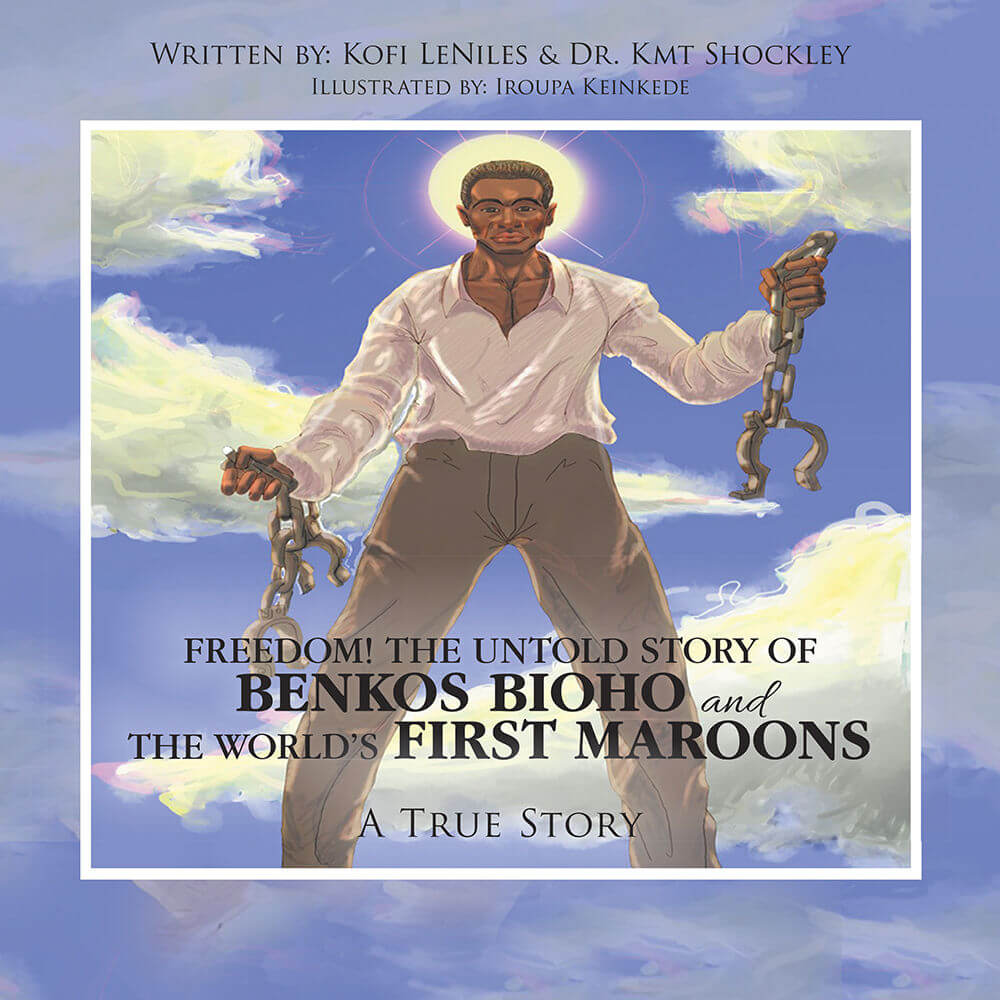 WASHINGTON (February 11, 2019) – A Howard University School of Education professor and doctoral student are highlighting the significance of an obscure group of African descendants through a newly released children’s book and accompanying documentary film. Written by Kofi LeNiles and Kmt G. Shockley, Ph.D., Freedom! The Untold Story of Benkos Bioho and the World’s First Maroons: A True Story, chronicles the life of Benkos Bioho, the founder of the world’s first Maroon village, a community composed of African natives who escaped capture during the transatlantic slave trade. The film is entitled For Humanity: Culture, Community & Maroonage. Both works will be discussed during a special event at the Thurgood Marshall Center, 1816 12thStreet Northwest, Washington, DC, Thursday, February 28, beginning at 6:30 p.m.
WASHINGTON (February 11, 2019) – A Howard University School of Education professor and doctoral student are highlighting the significance of an obscure group of African descendants through a newly released children’s book and accompanying documentary film. Written by Kofi LeNiles and Kmt G. Shockley, Ph.D., Freedom! The Untold Story of Benkos Bioho and the World’s First Maroons: A True Story, chronicles the life of Benkos Bioho, the founder of the world’s first Maroon village, a community composed of African natives who escaped capture during the transatlantic slave trade. The film is entitled For Humanity: Culture, Community & Maroonage. Both works will be discussed during a special event at the Thurgood Marshall Center, 1816 12thStreet Northwest, Washington, DC, Thursday, February 28, beginning at 6:30 p.m.
“The story of Benkos Bioho, and subsequently, Palenque, should be known throughout the world. The film and the children's book represent our efforts to shed light on a relatively unknown, but powerful story,” says LeNiles.
Freedom! introduces families to Bioho just before he was captured and transported to Colombia, South America. He soon spearheads a rebellion, resulting in the freedom of more than 30 enslaved people. Feeding off the momentum of their newfound freedom, Bioho and the others established Palenque San Basilio, in 1603, as the world’s first Maroon village. Throughout the transatlantic slave trade, dozens of Maroon villages were created in thick, densely forested regions to ensure safety from potential threats. While some Maroons escaped from plantations, others had always been free. For example, descendants of the first Maroons were born into villages as a free person. As time progressed, some Maroons mixed with indigenous people across the world.
Shockley says while most people have no idea these free societies ever existed, even fewer people realize that some Maroon villages still exist today.
“While Africans in the Americas were enslaved and Africans on the continent of Africa were colonized, the maroons provide a noteworthy example of the maintenance of African culture and sovereignty on the planet because historically they spent less time conquered than other African groups,” Shockley explains. “We are fortunate that we can still learn from their example.”
For a deeper dive into Palenquero identity and culture, Shockley and LeNiles produced a documentary, titled, For Humanity: Culture, Community and Maroonage. The film is being featured at the National Council for Black Studies Conference in New Orleans, LA, in March; they will also show the film in Palenque San Basilio in March, and they will show it in Washington, DC in February (see below). The film showcases the village’s strong roots and progressive practices. Centered around family and community, Palenque boasts a zero percent crime rate, a society both Shockley and LeNiles say all of humanity should be inspired by.
Freedom! The Untold Story of Benkos Bioho and the World’s First Maroons: A True Storyis available for purchase through Amazon, Barnes & Noble and Google Play. For Humanity: Culture, Community and Maroonage can be purchased here.
###
About Howard University
Founded in 1867, Howard University is a private, research university that is comprised of 13 schools and colleges. Students pursue studies in more than 120 areas leading to undergraduate, graduate and professional degrees. The University operates with a commitment to Excellence in Truth and Service and has produced four Rhodes Scholars, 11 Truman Scholars, two Marshall Scholars, one Schwarzman Scholar, over 70 Fulbright Scholars and 22 Pickering Fellows. Howard also produces more on-campus African-American Ph.D. recipients than any other university in the United States. For more information on Howard University visit www.howard.edu
Media contact: Ramzey Smith, Office of University Communications, Ramzey.smith@howard.edu




